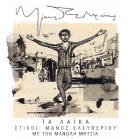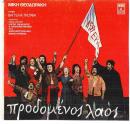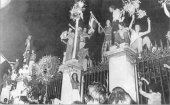Είμαστε δυο, είμαστε δυο,
η ώρα σήμανε οχτώ
κλείσε το φως, έμπα φρουρός,
το βράδυ θά ‘ρθουνε ξανά
'Eμπα μπροστά, έμπα μπροστά
και οι άλλοι πίσω ακολουθούν
μετά σιωπή και ακολουθεί
το ίδιο τροπάρι το γνωστό
Βαράνε δυο, βαράνε τρεις,
βαράνε χίλιοι δεκατρείς
Πονάς εσύ, πονάω εγώ,
μα ποιος πονάει πιο πολύ
θά ‘ρθει καιρός να μας το πει
Είμαστε δυο, είμαστε τρεις,
είμαστε χίλιοι δεκατρείς
Καβάλα πάμε στον καιρό
με τον καιρό με την βροχή
το αίμα πήζει στην πληγή
ο πόνος γίνεται καρφί
Είμαστε δυο, είμαστε τρεις,
είμαστε χίλιοι δεκατρείς
Καβάλα πάμε στον καιρό
με τον καιρό με την βροχή
το αίμα πήζει στην πληγή
ο πόνος γίνεται καρφί
Ο εκδικητής ο λυτρωτής
είμαστε δυο, είμαστε τρεις
είμαστε χίλιοι δεκατρείς
η ώρα σήμανε οχτώ
κλείσε το φως, έμπα φρουρός,
το βράδυ θά ‘ρθουνε ξανά
'Eμπα μπροστά, έμπα μπροστά
και οι άλλοι πίσω ακολουθούν
μετά σιωπή και ακολουθεί
το ίδιο τροπάρι το γνωστό
Βαράνε δυο, βαράνε τρεις,
βαράνε χίλιοι δεκατρείς
Πονάς εσύ, πονάω εγώ,
μα ποιος πονάει πιο πολύ
θά ‘ρθει καιρός να μας το πει
Είμαστε δυο, είμαστε τρεις,
είμαστε χίλιοι δεκατρείς
Καβάλα πάμε στον καιρό
με τον καιρό με την βροχή
το αίμα πήζει στην πληγή
ο πόνος γίνεται καρφί
Είμαστε δυο, είμαστε τρεις,
είμαστε χίλιοι δεκατρείς
Καβάλα πάμε στον καιρό
με τον καιρό με την βροχή
το αίμα πήζει στην πληγή
ο πόνος γίνεται καρφί
Ο εκδικητής ο λυτρωτής
είμαστε δυο, είμαστε τρεις
είμαστε χίλιοι δεκατρείς
envoyé par Giuseppina Dilillo
Langue: grec moderne
Trascrizione fonetica di massima del testo originale
Rough phonetical transcription of original Greek lyrics
Rough phonetical transcription of original Greek lyrics
IMASTE δJO
Ímaste δjo, ímaste δjo,
i óra símane oχtó
klíse to fos, é(m)ba frurós,
to vráδy ϑa 'rϑúne xaná
É(m)ba brostá, é(m)ba brostá
kji álji píso akoluϑún
metá siopí kje akoluϑí
to íδjo tropári to γnostó
Varáne δjo, varáne tris,
varáne çílji δekatrís
Ponás esý, ponáo eγó,
ma pjos ponái pjo poljý
ϑa 'rϑi kjerós na mas to pi
Ímaste δjo, ímaste tris,
ímaste çílji δekatrís
Kavála páme sto(n) gjeró
me to(n) gjeró me tin vroçí
to éma pízi sti(m) blijí
o pónos jínete karfí
Ímaste δjo, ímaste tris,
ímaste çílji δekatrís
Kavála páme sto(n) gjeró
me to(n) gjeró me tin vroçí
to éma pízi sti(m) blijí
o pónos jínete karfí
O egδikjitís o lytrotís
ímaste δjo, ímaste tris,
ímaste çílji δekatrís.
Ímaste δjo, ímaste δjo,
i óra símane oχtó
klíse to fos, é(m)ba frurós,
to vráδy ϑa 'rϑúne xaná
É(m)ba brostá, é(m)ba brostá
kji álji píso akoluϑún
metá siopí kje akoluϑí
to íδjo tropári to γnostó
Varáne δjo, varáne tris,
varáne çílji δekatrís
Ponás esý, ponáo eγó,
ma pjos ponái pjo poljý
ϑa 'rϑi kjerós na mas to pi
Ímaste δjo, ímaste tris,
ímaste çílji δekatrís
Kavála páme sto(n) gjeró
me to(n) gjeró me tin vroçí
to éma pízi sti(m) blijí
o pónos jínete karfí
Ímaste δjo, ímaste tris,
ímaste çílji δekatrís
Kavála páme sto(n) gjeró
me to(n) gjeró me tin vroçí
to éma pízi sti(m) blijí
o pónos jínete karfí
O egδikjitís o lytrotís
ímaste δjo, ímaste tris,
ímaste çílji δekatrís.
envoyé par Riccardo Venturi - 6/1/2009 - 01:44
Langue: italien
Versione italiana di Giuseppina Dilillo (2003)
Μετέφρασε στα Ιταλικά η Τζουζεπίνα Ντιλίλλο (2003)

Μετέφρασε στα Ιταλικά η Τζουζεπίνα Ντιλίλλο (2003)

Andonis Kaloyannis, tra gli interpreti della canzone.
La "storica" traduzione di Είμαστε δυο da parte di Giuseppina Dilillo può ben essere la prima traduzione dal greco comparsa in questo sito. Da notare che Giuseppina traduce χίλιοι δεκατρείς del testo originale con "mille e ventitré" per mantenere qui la rima; ma Theodorakis aveva inteso "mille e tredici". [CCG/AWS Staff]
SIAMO IN DUE
Siamo in due, siamo in due
e l’orologio segna le otto
spegni la luce e mettiti di guardia
stasera verranno di nuovo
Mettiti davanti mettiti davanti
e gli altri seguono da dietro
dopo il silenzio ricomincerà
il solito ben noto ritornello
Ne picchiano due, ne picchiano tre
ne picchiano mille e ventitré
soffri tu e soffro anch’io
ma chi soffre di più
sarà il tempo che ce lo dirà
Siamo in due, siamo in tre
siamo in mille e ventitré
andiamo a cavallo del tempo
e con il tempo e con la pioggia
il sangue si raggruma nella ferita
e il dolore diventa un chiodo
Siamo in due, siamo in tre
siamo in mille e ventitré
andiamo a cavallo del tempo
e con il tempo e con la pioggia
il sangue si raggruma nella ferita
e il dolore diventa un chiodo
Il vendicatore il liberatore
siamo in due siamo in tre
siamo in mille e ventitré.
Siamo in due, siamo in due
e l’orologio segna le otto
spegni la luce e mettiti di guardia
stasera verranno di nuovo
Mettiti davanti mettiti davanti
e gli altri seguono da dietro
dopo il silenzio ricomincerà
il solito ben noto ritornello
Ne picchiano due, ne picchiano tre
ne picchiano mille e ventitré
soffri tu e soffro anch’io
ma chi soffre di più
sarà il tempo che ce lo dirà
Siamo in due, siamo in tre
siamo in mille e ventitré
andiamo a cavallo del tempo
e con il tempo e con la pioggia
il sangue si raggruma nella ferita
e il dolore diventa un chiodo
Siamo in due, siamo in tre
siamo in mille e ventitré
andiamo a cavallo del tempo
e con il tempo e con la pioggia
il sangue si raggruma nella ferita
e il dolore diventa un chiodo
Il vendicatore il liberatore
siamo in due siamo in tre
siamo in mille e ventitré.
Langue: anglais
La versione inglese (dello stesso Mikis Theodorakis?)
Dalla pagina "Songs for Andreas di mikis-theodorakis.net
English version (by Mikis Theodorakis himself?)
From the "Songs for Andreas" page of mikis-theodorakis.net
Dalla pagina "Songs for Andreas di mikis-theodorakis.net
English version (by Mikis Theodorakis himself?)
From the "Songs for Andreas" page of mikis-theodorakis.net
It is at Vrachati that all those recollections of horror, so fresh in my memory, seized me again. Andreas (Lentakis) became the symbol of the struggling Greek people. Yes, we Greeks, we drink the treason with our milk, our wine. Betrayed people. Martyred people. At present they claim they can exterminate you. But it is certain that you shall become once more what you used to be. What you used to be during the War of Independence, during the Resistance movement and the Civil War. During those times, power was at the end of your gun.
Then come the visions from the terrace. The cries. The pain that pierces like a nail. Greek people they told you many lies. They have lulled you with false hopes. They knew in the East and the West that it was impossible for you to pursue your revolution to its end. Then why did they push you on? And who dared do it? For what purpose? To serve whose interests? In any case not yours. You could accomplish a revolution by your own means. And if you realised that you were going beyond those means, you would not have hesitated to retreat in order to regain your departure point.
But today we are not even there. You have fallen back in Prehistory. Ever since your liberation the steps you took forward made you inexorably retrogress, always more backwards. And why after all? Because you had been too confident. You had given everything: sweat and courage, family and future. You had given your blood without calculating. Streams of blood. But the time has now come: the time to reflect on the past, to become aware. The time of having confidence only in yourself.
* * *
The "Songs for Andreas" are complete. To relax I finish watering the garden and then I go to the studio for the recording. I inhale once more the fine odours of the watered soil.
The two dogs come and lie at my feet. A symphony in fa major. Loupos, the wolf-dog looks at me peacefully. He has confidence in me. I sing. He shuts his eyes. "What you once were, you shall become again." Down there, the blue sea glitters and calms me.
© Mikis Theodorakis - Vrachati, Spring 1968
AWS Staff Note. This version lacks a number of verses in comparison with the Greek original. It has been graphically re-arranged to fit the standards of this website.
Then come the visions from the terrace. The cries. The pain that pierces like a nail. Greek people they told you many lies. They have lulled you with false hopes. They knew in the East and the West that it was impossible for you to pursue your revolution to its end. Then why did they push you on? And who dared do it? For what purpose? To serve whose interests? In any case not yours. You could accomplish a revolution by your own means. And if you realised that you were going beyond those means, you would not have hesitated to retreat in order to regain your departure point.
But today we are not even there. You have fallen back in Prehistory. Ever since your liberation the steps you took forward made you inexorably retrogress, always more backwards. And why after all? Because you had been too confident. You had given everything: sweat and courage, family and future. You had given your blood without calculating. Streams of blood. But the time has now come: the time to reflect on the past, to become aware. The time of having confidence only in yourself.
* * *
The "Songs for Andreas" are complete. To relax I finish watering the garden and then I go to the studio for the recording. I inhale once more the fine odours of the watered soil.
The two dogs come and lie at my feet. A symphony in fa major. Loupos, the wolf-dog looks at me peacefully. He has confidence in me. I sing. He shuts his eyes. "What you once were, you shall become again." Down there, the blue sea glitters and calms me.
© Mikis Theodorakis - Vrachati, Spring 1968
AWS Staff Note. This version lacks a number of verses in comparison with the Greek original. It has been graphically re-arranged to fit the standards of this website.
WE ARE TWO
We are two, we are two,
the clock was sounding eight.
Put off the light! The guard is knocking.
Tonight, they will come again.
One leads the way,
the others follow
Then silence:
always that well known refrain.
They knock twice, they knock three times,
they knock a thousand and three times
We ride time in the rain,
the blood is drying on the wound
Pain is but a point now.
The judge, the liberator.
We are two
We are three,
We are one thousand and three.
We are two, we are two,
the clock was sounding eight.
Put off the light! The guard is knocking.
Tonight, they will come again.
One leads the way,
the others follow
Then silence:
always that well known refrain.
They knock twice, they knock three times,
they knock a thousand and three times
We ride time in the rain,
the blood is drying on the wound
Pain is but a point now.
The judge, the liberator.
We are two
We are three,
We are one thousand and three.
envoyé par CCG/AWS Staff - 3/5/2012 - 02:27
Langue: français
La versione francese di Georges Moustaki.
La version française de Georges Moustaki
Grazie a Colette del newsgroup it.cultura.linguistica.francese per averla postata e segnalata.
Un très grand merci à Colette du forum Usenet it.cultura.linguistica.francese pour l'avoir postée et signalée.
La version française de Georges Moustaki
Grazie a Colette del newsgroup it.cultura.linguistica.francese per averla postata e segnalata.
Un très grand merci à Colette du forum Usenet it.cultura.linguistica.francese pour l'avoir postée et signalée.
Francia, 1970: in questo video Mikis Theodorakis e Georges Moustaki preparano la versione francese di "Imaste diò" [gpt]:
(Da notare che anche Moustaki trasforma, come la Dilillo nella sua versione italiana, χίλιοι δεκατρείς in "mille et vingt trois" per questioni di rima.) [RV]
(Da notare che anche Moustaki trasforma, come la Dilillo nella sua versione italiana, χίλιοι δεκατρείς in "mille et vingt trois" per questioni di rima.) [RV]
NOUS SOMMES DEUX
Nous sommes deux nous sommes deux
Huit heures vont bientôt sonner
Eteins la lampe le gardien frappe
Ce soir ils reviendront nous voir
L'un va devant l'un va devant
Et les autres suivent derrière
Puis le silence et puis voici
La même chanson qui revient
Ils tapent deux ils frappent trois
Ils frappent mille vingt et trois
Tu as mal toi et j'ai mal moi
Qui de nous deux a le plus mal
C'est l'avenir qui le dira
Nous sommes deux nous sommes trois
Nous sommes mille vingt et trois
Avec le temps avec la pluie
Avec le sang qui a séché
Et la douleur qui vit en nous
Qui nous transperce et qui nous cloue
Nous sommes deux nous sommes trois
Nous sommes mille vingt et trois
Avec le temps avec la pluie
Avec le sang qui a séché
Et la douleur qui vit en nous
Qui nous transperce et qui nous cloue
Notre douleur nous guidera
Nous sommes deux nous sommes trois
Nous sommes mille vingt et trois.
Nous sommes deux nous sommes deux
Huit heures vont bientôt sonner
Eteins la lampe le gardien frappe
Ce soir ils reviendront nous voir
L'un va devant l'un va devant
Et les autres suivent derrière
Puis le silence et puis voici
La même chanson qui revient
Ils tapent deux ils frappent trois
Ils frappent mille vingt et trois
Tu as mal toi et j'ai mal moi
Qui de nous deux a le plus mal
C'est l'avenir qui le dira
Nous sommes deux nous sommes trois
Nous sommes mille vingt et trois
Avec le temps avec la pluie
Avec le sang qui a séché
Et la douleur qui vit en nous
Qui nous transperce et qui nous cloue
Nous sommes deux nous sommes trois
Nous sommes mille vingt et trois
Avec le temps avec la pluie
Avec le sang qui a séché
Et la douleur qui vit en nous
Qui nous transperce et qui nous cloue
Notre douleur nous guidera
Nous sommes deux nous sommes trois
Nous sommes mille vingt et trois.
envoyé par Colette & Riccardo Venturi - 18/6/2005 - 18:24
Langue: portugais
La versione portoghese di Marco Aurélio Funchal, da stixoi.info
Versão portuguesa de Marco Aurélio Funchal, desde stixoi.info
Versão portuguesa de Marco Aurélio Funchal, desde stixoi.info
Letra: Mikis Theodorakis
Música: Mikis Theodorakis
Desempenho primeiro: Mikis Theodorakis
Outras performances:
Antonis Kalogiannis
Marco Aurelio Funchal © 22-02-2011 @ 01:55
Música: Mikis Theodorakis
Desempenho primeiro: Mikis Theodorakis
Outras performances:
Antonis Kalogiannis
Marco Aurelio Funchal © 22-02-2011 @ 01:55
SOMOS DOIS
Somos dois, somos dois
a hora, significava oito
apague a luz, palpita a marcha
a noite chegará, chegará de novo
rancor a frente, rancor a frente
e os outros, atrás seguem
depois silêncio e seguido
e o mesmo conhecido hino
Bate dois, bate três
bate mil trezes,
Sofre você, sofro eu
mas o que foi pouco mais
Encontrará o tempo para nos dizer
Somos dois, somos três
somos mil trezes
Cavalo, vamos no tempo
com o tempo, com a chuva
o sangue coagula na ferida
a dor se torna aderente
Somos dois, somos três
somos mil trezes
Cavalo, vamos no tempo
com o tempo, com a chuva
o sangue coagula na ferida
a dor se torna aderente
O vencedor vingador
Somos dois, somos três
somos mil trezes
Somos dois, somos dois
a hora, significava oito
apague a luz, palpita a marcha
a noite chegará, chegará de novo
rancor a frente, rancor a frente
e os outros, atrás seguem
depois silêncio e seguido
e o mesmo conhecido hino
Bate dois, bate três
bate mil trezes,
Sofre você, sofro eu
mas o que foi pouco mais
Encontrará o tempo para nos dizer
Somos dois, somos três
somos mil trezes
Cavalo, vamos no tempo
com o tempo, com a chuva
o sangue coagula na ferida
a dor se torna aderente
Somos dois, somos três
somos mil trezes
Cavalo, vamos no tempo
com o tempo, com a chuva
o sangue coagula na ferida
a dor se torna aderente
O vencedor vingador
Somos dois, somos três
somos mil trezes
envoyé par Riccardo Venturi - 3/5/2012 - 01:52
Langue: néerlandais
Versione neerlandese di Renehaentjens da stixoi.info
WE ZIJN MET TWEE
We zijn met twee, we zijn met twee,
acht uur luidde de klok
doof het licht, daar is de bewaker
vanavond zullen ze terugkomen
Kom binnen, hier voor me
daarachter volgen de anderen
dan is het zwijgen en volgt
dezelfde bekende litanie
Twee slaan, drie slaan,
duizend dertien slaan
Jij hebt pijn, ik heb pijn,
maar wie heeft het meeste pijn
de tijd zal het ons leren
We zijn met twee, we zijn met drie
we zijn met duizend dertien
Als ruiters gaan we door de tijd
door regen en wind
het bloed stolt in de wonde
de pijn wordt spijkerhard
We zijn met twee, we zijn met drie
we zijn met duizend dertien
Als ruiters gaan we door de tijd
door regen en wind
het bloed stolt in de wonde
de pijn wordt spijkerhard
De vergelder de verlosser
we zijn met twee, we zijn met drie
we zijn met duizend dertien.
We zijn met twee, we zijn met twee,
acht uur luidde de klok
doof het licht, daar is de bewaker
vanavond zullen ze terugkomen
Kom binnen, hier voor me
daarachter volgen de anderen
dan is het zwijgen en volgt
dezelfde bekende litanie
Twee slaan, drie slaan,
duizend dertien slaan
Jij hebt pijn, ik heb pijn,
maar wie heeft het meeste pijn
de tijd zal het ons leren
We zijn met twee, we zijn met drie
we zijn met duizend dertien
Als ruiters gaan we door de tijd
door regen en wind
het bloed stolt in de wonde
de pijn wordt spijkerhard
We zijn met twee, we zijn met drie
we zijn met duizend dertien
Als ruiters gaan we door de tijd
door regen en wind
het bloed stolt in de wonde
de pijn wordt spijkerhard
De vergelder de verlosser
we zijn met twee, we zijn met drie
we zijn met duizend dertien.
envoyé par Riccardo Venturi - 6/1/2009 - 01:31
La pagina di questa canzone è stata interamente rifatta. Prima di tutto, è stata tolta a Andonis Kaloyannis, che pure ne è stato interprete: ma poiché la prima registrazione è di Mikis Theodorakis stesso (che l'ha anche cantata più volte), è stata riportata finalmente al suo autore effettivo. Nelle "CCG primitive" (di cui essa fa parte) accadeva spesso che una canzone venisse inserita sotto il nome di interpreti posteriori, a seconda delle conoscenze di chi la inseriva (probabile, ad esempio, che la Dilillo la conoscesse principalmente nell'interpretazione di Kaloyannis, che è comunque molto famosa); e per controllare non avevamo, allora, i mezzi a disposizione adesso. Sono state aggiunte un'introduzione trilingue (italiano, greco e inglese) e le versioni inglese e portoghese. Il video della versione francese preparata assieme da Georges Moustaki e Mikis Theodorakis, proposto da [gpt], è stato riportato sotto tale versione. Crediamo con questo di avere doverorsamente risistemato la pagine dedicata ad una delle più famose canzoni greche contemporanee.
CCG/AWS Staff-Eλληνικό Τμήμα - 3/5/2012 - 02:40
Tempo addietro mi capitò di leggere da qualche parte che "Imaste diò" in versione araba fosse stato adottato dall'OLP o da altra organizzazione palestinese di resistenza. C'è qualcuno che mi possa confermare ovvero smentire questa vaghissima informazione?
Gian Piero Testa - 4/5/2012 - 00:07
Caro GPT,
in questo video trovo, tra le altre (guarda tra i primi commenti per gli altri titoli), Είμαστε δυο messa in relazione alla causa palestinese... Non so però se sia stata adottata da qualche loro organizzazione...
Ciao
in questo video trovo, tra le altre (guarda tra i primi commenti per gli altri titoli), Είμαστε δυο messa in relazione alla causa palestinese... Non so però se sia stata adottata da qualche loro organizzazione...
Ciao
Bartleby - 4/5/2012 - 09:29
Η ΔΙΚΤΑΤΟΡΙΑ ΤΩΝ ΣΥΝΤΑΓΜΑΤΑΡΧΩΝ του Ροβήρου Μανθούλη
LA DITTATURA DEI COLONNELLI di Roviros Manthoulis
Si tratta di un documentario completo sulla dittatura dei Colonnelli mandato in onda dalla TV greca nel 1998. E' interamente in lingua greca (ma con interventi in inglese, francese e anche italiano), ma va guardato per la documentazione completa sui 7 anni della dittatura. Vi compare anche questa canzone, cantata direttamente da Mikis Theodorakis.
LA DITTATURA DEI COLONNELLI di Roviros Manthoulis
Si tratta di un documentario completo sulla dittatura dei Colonnelli mandato in onda dalla TV greca nel 1998. E' interamente in lingua greca (ma con interventi in inglese, francese e anche italiano), ma va guardato per la documentazione completa sui 7 anni della dittatura. Vi compare anche questa canzone, cantata direttamente da Mikis Theodorakis.
Riccardo Venturi - 8/5/2012 - 18:55
×
![]()








[1968]
Στίχοι: Μίκης Θεοδωράκης
Από τα Τραγούδια για τον Αντρέα Λεντάκη
Μουσική: Μίκης Θεοδωράκης
Πρώτη εκτέλεση: Μίκης Θεοδωράκης
'Αλλη ερμηνεία: Αντώνης Καλογιάννης
Testo e musica: Mikis Theodorakis
dalle Canzoni per Andreas Lendakis
Primo interprete: Mikis Theodorakis
Altro interprete: Andonis Kaloyannis
Lyrics and music: Mikis Theodorakis
From the Songs for Andreas Lentakis
First performed by: Mikis Theodorakis
Also performed by: Andonis Kaloyannis
Είμαστε δυο, είμαστε τρεις, είμαστε χίλιοι δεκατρείς...
Είναι ένα από τα συμβολικά τραγούδια της αντίστασης στη δικτατορία των Ελληνών συνταγματάρχων. Είναι ένα από τα συμβολικά τραγούδια της αντίστασης στο βασανιστήριο. Είναι συμβολικό τραγούδι, εν συντομία· όπως και να το θεωρούμε, το τραγούδι αυτό είναι, προ πάντων, το σύμβολο αυτού που ο δημιουργός του, ο Μίκης Θεοδωράκης, το έπαθε προσωπικά κατά την φυλάκησή του για πολιτικές αιτίες. Και, μαζί μ' αυτόν, άλλοι δύο, τρεις, χίλιοι δεκατρείς και μυριάδες άνθρωποι που, σε κάθε εποχή και σε όλες τις χώρες, έπαθαν τη καθημερινή βία της εξουσίας και του κράτους (όπως ο αντιφασίστας και μαθηματικός Αντρέας Λεντάκης, για τον οποίον ο Θεοδωράκης έγραψε το επίσης γνωστó Σφαγείο κι άλλα τραγούδια). Λίγα άλλα θα μπορέσουμε να πούμε· Είμαστε δυο είναι απολύτως ένα από τα γνωστότατα τραγούδια που γράφτηκαν στην Ελληνική γλώσσα. 'Ενα τραγούδι που δε θα χάσει ποτέ την επικαιρότητά του, δυστυχώς. Το έγραψε το 1968 ένας άνθρωπος που μία δικτατορία τον είχε φυλακίσει με χτυπήματα κι άλλες αυθαιρεσίες· γράφτηκε γι' όλους αυτούς που, από τις αρχαιότατες εποχές μέχρι ως σήμερα, έπαθαν τα ίδια. Ακριβώς τώρα, άλλοι δύο, τρεις, χίλιοι δεκατρείς. [PB]
We are two, we are three, we are thousands...
This song is a symbol of the resistance against the Greek military dictatorship. It is also a symbol of the opposition against torture. It is a symbolic song under any aspect and, above all, the symbol of what its author, the great Mikis Theodorakis, had to endure in person as a prisoner for political reasons. And, together with him, other two, three and thousands of people who had, and still have, to face the daily violence of power and the State (like the antifascist mathematician Andreas Lentakis, for whom Theodorakis composed the equally known Το σφαγείο and other songs). There is hardly anything to add: Είμαστε δυο is one of the best known songs even composed in the Greek language. Sadly enough, a song that is not likely to lose anything of its actuality. It was written 1968 by a man imprisoned and tortured by order of a dictatorship, and that man wrote it for anyone who endured the same from the oldest times up to modern days. Just now: other two, three, thousands. [RV]